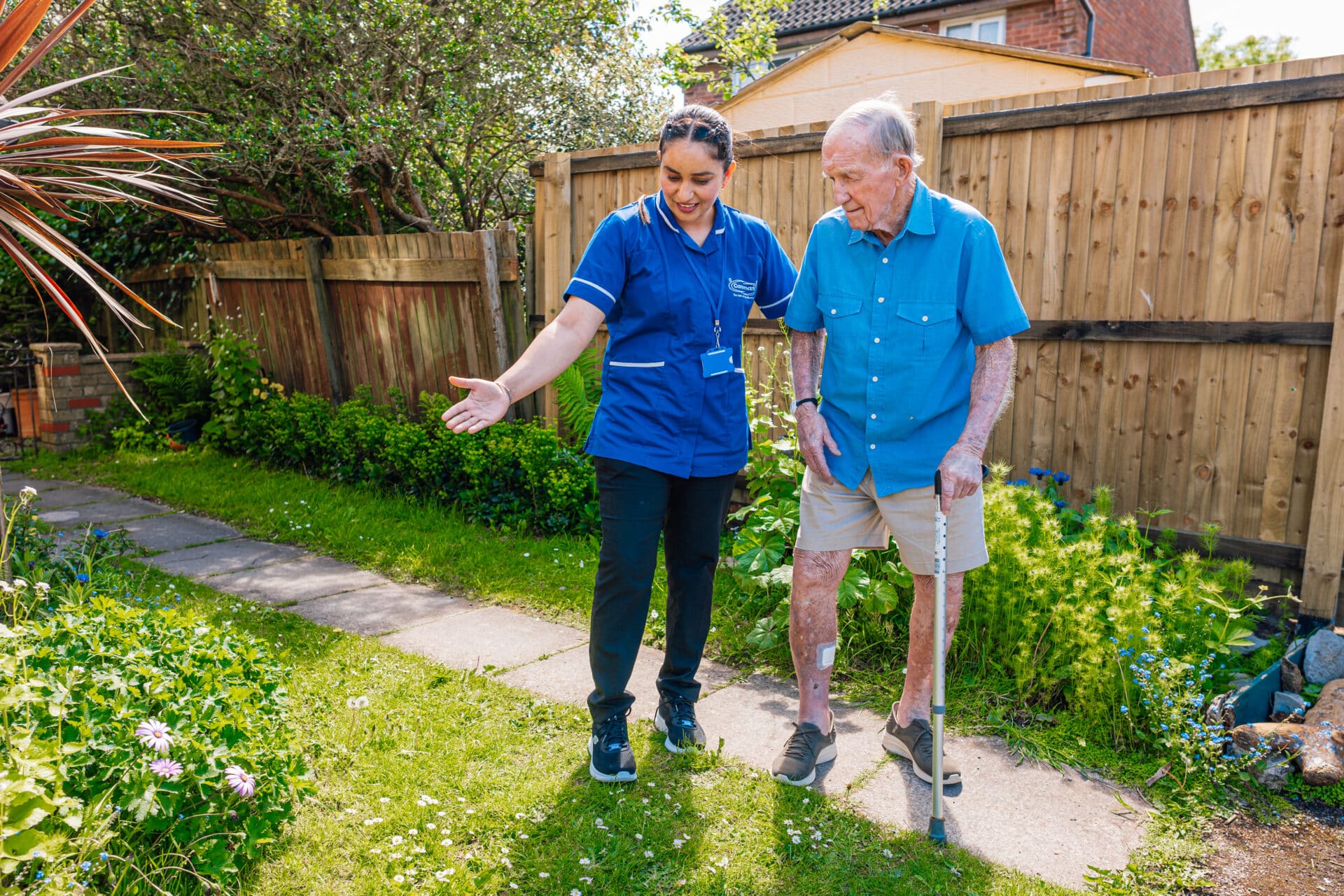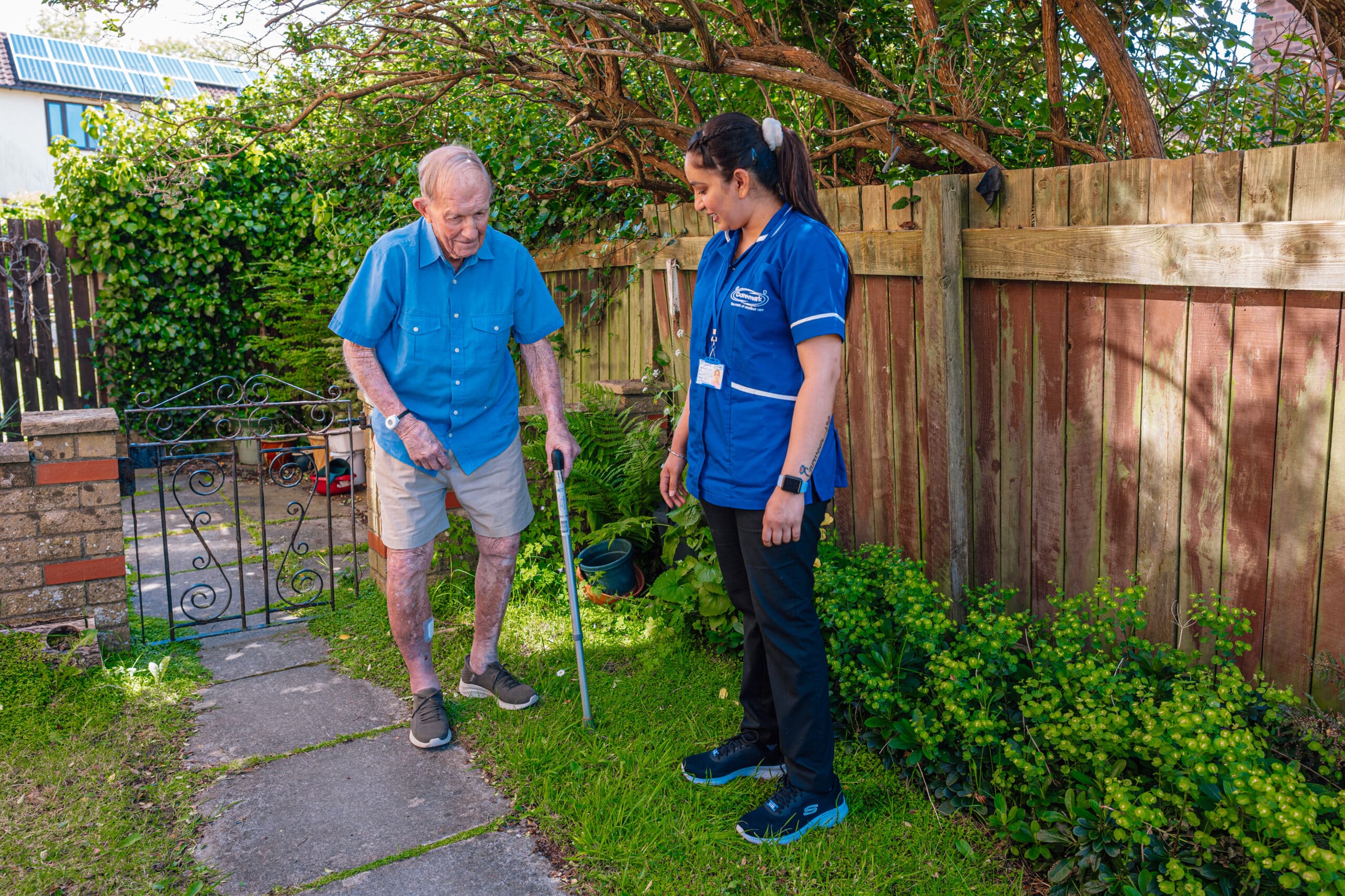Keep Bones Healthy over 65 – Your Musculoskeletal Health

In a nutshell, our ‘Musculoskeletal Health’ refers to the ‘well-being’ of the bones, muscles, joints and connective tissues in our bodies, which are essential for movement and quality of life. We all know that our bones tend to lose strength as we get older. But there’s still plenty we can do to prevent falls and injury.
Stay Active
If you don’t exercise as you get older, your muscles and bones will lose strength. This increases your risk of osteoporosis, falls and fractures. National research undertaken by the UK Chief Medical Officers (CMOs) advises that everyone over the age of 65 should try to get 150 minutes (2 and a half hours) of some form of ‘moderate intensity exercise’ every week.
Ideally, we should exercise daily; doing something is always better than doing nothing and if you can manage to exercise outdoors, even better!
So, what is ‘moderate intensity exercise’? Literally any activity that increases your heart rate; making you breathe faster and feel warmer. A good way to tell if you’re exercising at a moderate level is if you can still talk but can’t sing the words to a song.
Examples of moderate-intensity activities
- walking
- water aerobics
- ballroom and line dancing
- riding a bike on level ground or with few hills
- playing doubles tennis
- pushing a lawn mower
Additionally, we should also try and include some muscle strengthening exercises each week, such as:
- lifting weights
- dancing
- carrying bags of shopping
- going up and down stairs
- exercising to music
- heavy gardening, such as digging or shovelling
- yoga
And, if you can also include activities into your daily routine which support and improve balance and flexibility, all the better! Yoga and Tai Chi are great for this as they can also help ease stiffness and unsteadiness which accompany painful joints.
However, if you can’t find any local classes or have limited transport options, then there are always things that you can do without leaving the comfort of your own front room!
Chair-based exercises are the ‘go-to’ and can be completed by just sitting on a supportive, sturdy dining table chair or similar. Lots of information is available online and there are videos on YouTube of short 10–30-minute sessions which you can exercise along to.
As with everything, if you are not used to doing exercise on a regular basis, please consult your GP before starting and ensure that you exercise at your own pace and comfort level, stopping for regular rests where needed.
However, sitting around for long periods of time during the day is not supportive of good musculoskeletal health. So, if you find you have been sitting for a long time, get up and go for a short walk.
Eating for Musculoskeletal Health
Often as we age, our appetite starts to diminish. Eating less can make it more difficult to get the nutrients we need to keep our muscles and bones healthy.
By staying active, our bodies will automatically and subconsciously tell us that we need to fuel them. However, some days we may not feel like eating much, and on these days, it is even more important to stick to a healthy, balanced diet.
For healthy muscles and bones, you need calcium, vitamin D and protein:
- calcium keeps our bones and teeth healthy
- vitamin D helps our bodies to absorb calcium
- protein is important for muscle maintenance
Another reason to eat a balanced diet is that it will help you to maintain a healthy body weight. Being underweight is linked to a higher risk of fractures.
If your diet isn’t as good as it should be, you may want to consider taking a dietary supplement; ones that contains calcium and vitamin D, both of which support bone health. Your GP or pharmacist can help you choose one that’s suitable for you.

Other Ways to Protect your Musculoskeletal Health
Other things that help prevent falls and fractures:
- make your home safer to prevent accidents
- stopping smoking and cutting down on alcohol
- go for an eye test – poor eyesight can affect mobility and balance
- get your hearing checked – ear problems can affect your balance
- look after your feet – foot pain can affect your mobility
- review your medicines with your GP or pharmacist – some medicines can make you feel dizzy or drowsy
How Caremark Makes a Difference
Our registered Care Manager, Jo Folkes, qualified as a Physiotherapist in 2016 and worked for Gloucester Royal Hospital as an orthopaedic physiotherapist. During this time, Jo worked closely with the Discharge Team and Occupational Therapy.
“Caremark provides care to its customers who require assistance and have conditions such Alzheimer’s, dementia, arthritis, motor neurone disease, diabetes and MS etc. The care services we provide very much depend on the individual’s needs. An important part of what we do, for which we are very proud, is to encourage our clients to maintain their independent living for as long as possible” says Jo.
Staying active is vitally important. The mind and body are not separate. What affects one, affects the other.
Therefore, exercising can have a profoundly positive effect on your overall mood, as well as many mental health conditions such as depression, anxiety etc. It can also help you sleep better and improve your memory.
Therefore, we believe if your body is strong and healthy, then your mind will be also.
“We encourage our customers to be proactive, not reactive. Caremark help them build on their current strength levels and support them in maintaining them. We assess their mobility and then create a bespoke, individualised exercise plan which forms part of their overall care plan. We watch them practice their exercises to ensure they are being done correctly and provide support with any issues or questions. Above all, we promote independent living as much as possible for as long as possible”.
About Caremark Cheltenham & Tewkesbury – Community Involvement
Caremark also like to give back to the community and, for the last 15 months, have been running free monthly coffee mornings incorporating a chair-based exercise session at St Pip and St Jims Church, GL50 2DD.
These have proved very popular with local residents, one of whom travels from Hatherley on her motorised scooter. Of course, there is also the draw of a chat over a cup of tea of coffee afterwards and a slice of cake!
At Caremark, we want to help our customers with their wellbeing through the promotion of physical activity, provision of appropriate hydration and nutrition advice and encouragement to maintain independence.
Leaving them feeling fit, happy and fulfilled!
Want to keep your musculoskeletal health happy? Then click here to read about what happened at our last free coffee morning and for details of our next events.